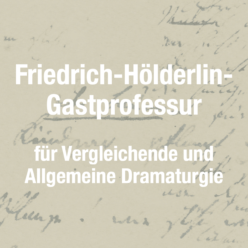Israeli Cultures of Performance: Visions and Revisions
Dienstag, 12-14 Uhr, Raum 1.411, IG Farben-Haus, Campus Westend
This course will examine the ways in which Israeli theatre and performance have been evolving around a more or less fixed cluster of nationally-formative themes, texts and events: the Hebrew Bible (the Old Testament); Jewish history, and in particular the Holocaust; and the everyday expressions of Israel’s geopolitical situation and everyday realities, in particular in relation to the Israeli/Palestinian conflict. Artists, scholars, and intellectuals have been negotiating and re-negotiating these clusters of narrative formations from various perspectives, carefully and self-consciously examining and coordinating the actions and expressions constituting the Israeli national culture, the language(s) developed to describe these actions through day-to-day reporting and the more distanced modes of writing of the history of these themes. All of these clusters and modes of expression can be found in the artistic and performative expressions produced by the Israeli national culture that will be examined in this course.
The Israeli Cultures of Performance, including established as well as avant-garde-theatres, different forms of performance art, including also dance and movement theatre, are based on a language with ancient roots which is still (or rather, again) a living language, which at the same time has no theatrical/performance tradition before the beginning of the 20th century. The Israeli Cultures of Performance (including the period before 1948, when the State of Israel was established) have held a central role in the self-fashioning of an Israeli identity where the very notion of ‘performance’ has been crucial for the understanding of recent Jewish history as well as what it means (and could mean) to establish a state where Jews constitute the majority of the citizens. The course will examine the ways in which these three thematic clusters – the Bible, Jewish history (in particular the Holocaust) and the present-day ‘realities’ – have been expressed in a broad range of texts and performances. At the same time I also want to highlight the representations of the multi-cultural aspects of Israeli society and culture, drawing attention to the representational strategies of inclusion and exclusion in the Israeli society (parliamentary, legal economic) as well as to its cultural (in particular, theatre and performance, but also in some films).
